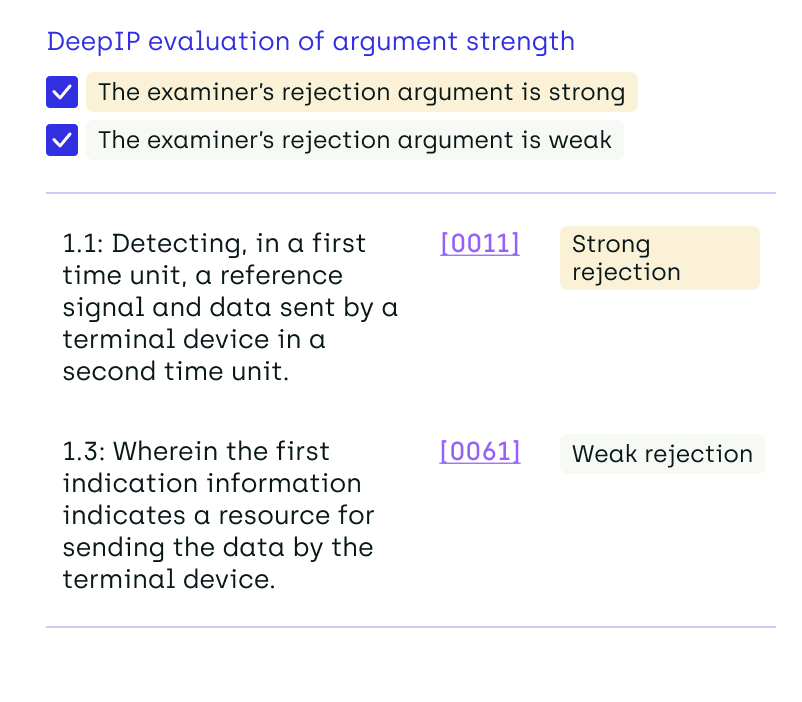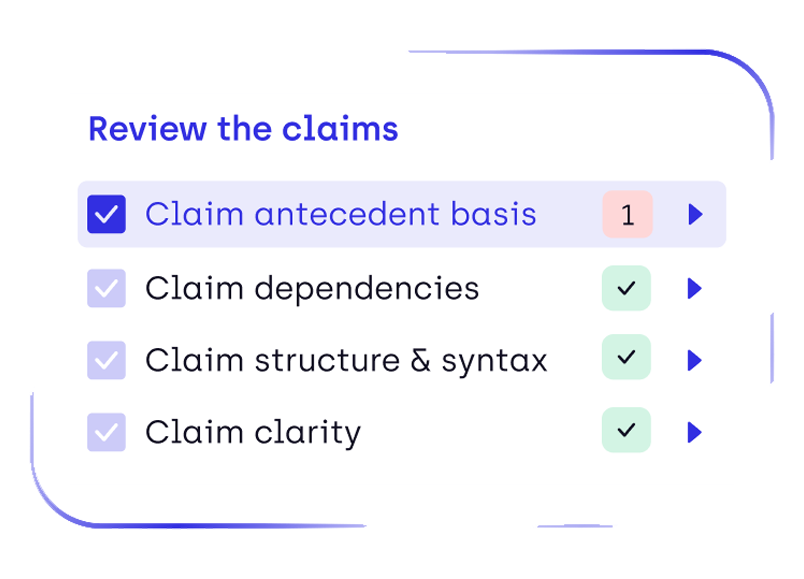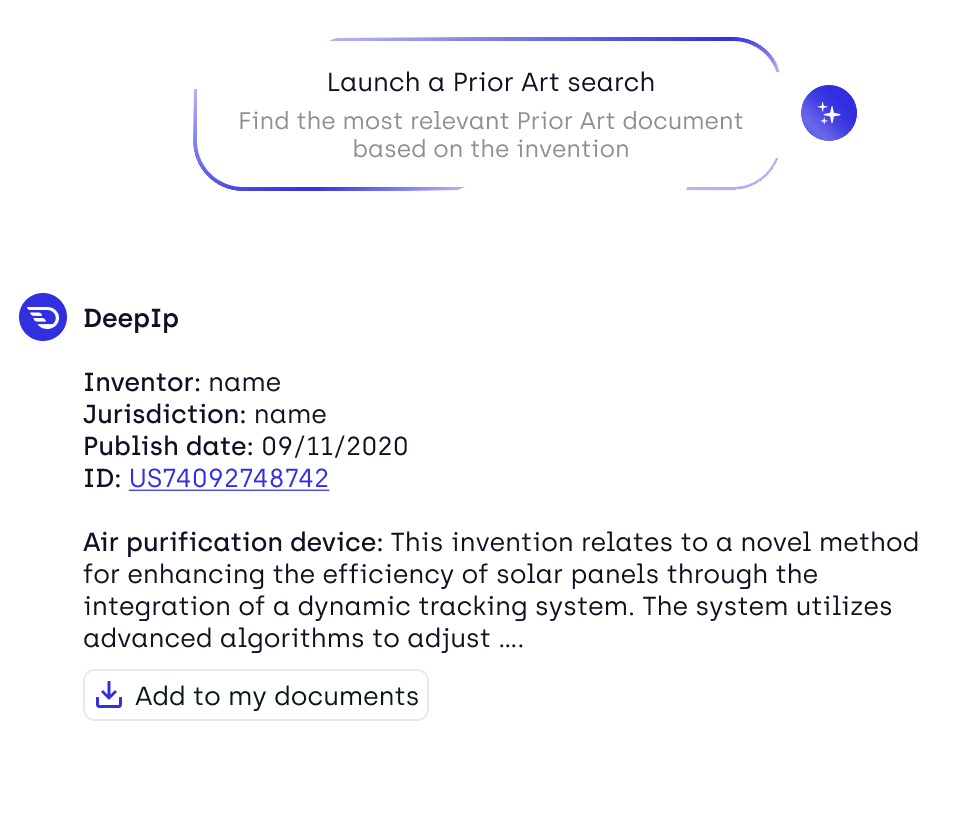The landscape of Intellectual Property (IP) and patent drafting is evolving rapidly, thanks to the rise of Artificial Intelligence (AI) tools. However, despite the growing use of AI in these fields, it's understandable that there's still a fair amount of skepticism among professionals and clients alike.
People often wonder: Can AI really handle the complexities of patent drafting? Will it compromise the quality and security of sensitive information?
In this article, we’ll dive into some of the most common concerns surrounding the use of AI for IP and patent drafting.
We'll explore the benefits these tools bring to the table, directly address any fears or misconceptions, and demonstrate why AI can be a powerful ally in the world of IP.
As AI becomes more embedded in IP practices, it’s crucial to help everyone—from seasoned professionals to cautious clients—understand the advantages it offers, the robust security measures that are in place, and what the future looks like for AI-assisted patent drafting.
By the end of this article, you'll see how AI isn't just a passing trend; it's a valuable asset that, when integrated thoughtfully, can significantly enhance the quality, efficiency, and security of IP and patent services.
Understanding AI Tools in IP & Patent Drafting
Think of AI tools in IP and patent drafting as your digital allies, designed to enhance your expertise rather than replace it.
By taking over the repetitive, time-consuming tasks that can slow you down, these tools boost accuracy and make your workflow more efficient. With sophisticated algorithms, AI can handle tasks like searching for prior art, drafting patent applications, and identifying errors that might go unnoticed by human eyes.
For example, imagine how much time you could save when AI quickly sifts through vast amounts of data to find relevant prior art, suggests precise modifications to your drafts, and catches inconsistencies before they become issues. By leveraging the capabilities of AI tools like DeepIP AI, you can focus on what truly matters—strategic, high-value activities that require your legal expertise and creativity.
This not only enhances the quality of your work but also makes your practice more efficient and responsive to client needs. In the end, it's about working smarter, not harder, and using AI to elevate the standard of service you provide.
Common Objections from IP Professionals
Despite the clear benefits, some IP professionals remain hesitant to adopt AI tools due to several common objections:
1. Quality of AI-Generated Content
Objection: There is a concern that AI-generated drafts may lack the precision and quality of content produced by experienced human attorneys. This fear is rooted in the belief that AI cannot fully understand the nuances and complexities involved in patent drafting, potentially leading to subpar results.
Reality: AI tools like DeepIP AI are designed not to replace human expertise but to enhance it. These tools provide suggestions and drafts that attorneys can then refine, ensuring that the final output meets the highest standards of quality. Advanced machine learning algorithms continuously improve based on user feedback, making AI-generated content more precise and reliable over time.
Moreover, AI tools can handle the initial draft and error-checking processes, allowing human attorneys to focus on refining the content and ensuring its alignment with legal standards and client expectations.
2. Dependence on Technology
Objection: Some professionals fear that over-reliance on AI could diminish human expertise and critical thinking skills, making attorneys overly dependent on technology.
Reality: Think of AI tools as your reliable assistant rather than a replacement for your role as an attorney. They’re here to handle the repetitive, time-consuming tasks that can bog you down, allowing you to focus on what you do best—complex, strategic work that requires your unique human judgment and creativity.
By taking over these routine activities, AI tools free up your time and mental energy, letting you concentrate on areas where you can truly add the most value. This shift not only helps you sharpen your expertise but also enhances your ability to make well-informed, impactful decisions.
Moreover, AI isn’t just a tool for automating tasks; it’s also a powerful resource for learning and development. By providing valuable insights and suggestions, AI can help you gain a deeper understanding of patent drafting techniques and strategic considerations.
It’s like having a knowledgeable colleague who’s always there to offer guidance, helping you refine your skills and stay at the forefront of your field.
Embracing AI means leveraging technology to complement your work, making you more effective and ensuring that you can deliver the best possible service to your clients.
{{block-cta}}
The most common Client Concerns
It's not just professionals who might have reservations about using AI in patent drafting; clients have their concerns too. They're often worried about data security and the quality of AI-generated content.
Addressing these concerns head-on by discussing the robust security measures in place and demonstrating the quality of AI-assisted drafts can go a long way in building their trust and confidence in using AI technology
1. Data Security Concerns
Objection: Clients often worry about the confidentiality and security of their sensitive information when AI tools are involved in the patent drafting process. This concern stems from the fear that AI platforms may not adequately protect data from breaches or unauthorized access.
Reality: AI tools like DeepIP AI prioritize data security with robust encryption and compliance with international data protection regulations such as the General Data Protection Regulation (GDPR).
DeepIP AI adheres to stringent security policies, including:
- NIST 800-53 Moderate and NIST Cybersecurity Framework (CSF) standards
- TLS 1.2+ protocols
- symmetric encryption (AES-256)
- zero-retention API policies
- and certifications like SOC2 Type II, ISO27001, and HIPAA.
These measures ensure that client data is not only secure but also handled in a manner that maintains confidentiality and trust. By proactively communicating these security features to clients, IP professionals can alleviate concerns and build confidence in the use of AI tools.
2. Quality and Accuracy
Objection: Clients may fear that using AI might compromise the quality and accuracy of the patent drafting process, leading to errors or omissions that could weaken patent protection.
Reality: AI tools are equipped with sophisticated algorithms that significantly enhance the accuracy of both patent drafts and prior art searches.
Think of them as providing a reliable first layer of review, which skilled attorneys can then refine, ensuring that the final results are of the highest quality. By letting AI handle the more mechanical and repetitive aspects of drafting and reviewing, you as an attorney can dedicate your expertise to higher-level analysis and strategic thinking. This approach not only leads to more robust and well-crafted patent applications but also enhances the overall efficiency of your practice.
Clients might still have reservations about relying on AI for such critical tasks, which is why demonstrating the accuracy and reliability of AI-assisted drafts is key. Sharing case studies and real-world examples can go a long way in reassuring clients that these tools are not just dependable but are actually enhancing the quality of their patent applications. By showing how AI can complement your skills and improve outcomes, you help clients see that embracing AI is about leveraging technology to achieve the best possible results.
Strategies for answering Clients objections
To address both professional and client concerns effectively, it's essential to employ strategies that educate and inform stakeholders about the benefits and functionality of AI tools in IP and patent drafting.
As a patent lawyer, you understand the importance of clear and transparent communication, especially when introducing new technologies to your practice. When it comes to AI tools, it’s crucial to clearly explain how these tools work, the benefits they bring, and the security measures in place to protect sensitive client data.
Transparency isn't just about being open; it's about building trust and helping both your team and your clients feel comfortable with AI's role in your work. By demystifying AI, you make it easier for everyone involved to see its value and integrate it into daily operations.
Consider using real-world demonstrations and case studies to show AI tools in action. Nothing is more convincing than seeing the tangible results AI can achieve.
When clients witness firsthand how AI-assisted projects have succeeded, whether it’s speeding up patent searches or improving the accuracy of draft applications, it builds confidence in these tools. It's one thing to hear about the benefits of AI, but seeing actual examples of success can be highly persuasive.
Lastly, focus on highlighting the clear benefits AI tools like DeepIP AI offer. Emphasize how they enhance efficiency, increase accuracy, and save costs. Discuss how AI leads to faster turnaround times, reducing the hours spent on repetitive tasks, and freeing up your time for more strategic thinking.
By illustrating these tangible benefits, you help your clients understand that integrating AI into their IP practices isn’t just about adopting the latest tech trend; it's about delivering better, faster, and more reliable patent services. In the fast-evolving world of IP law, staying ahead means embracing these innovations to provide the highest quality service to your clients.
The Benefits of integrating AI in your IP practice
Integrating AI tools into IP and patent drafting practices offers numerous benefits that can enhance the overall quality and efficiency of the process:
- Increased Efficiency: AI tools can automate routine tasks, freeing up time for attorneys to focus on more strategic and high-value activities.
A Research from McKinsey & Company in 2021 highlights that AI tools can slash the time needed for patent searches and drafting by up to 50%, freeing up legal experts to focus on strategic elements of patent law and enhancing client services. (source: “The State of AI”, McKinsey, 2021)
- Improved Accuracy: AI enhances the accuracy of patent drafts and prior art searches by reducing errors and ensuring accuracy. (source: Elizabeth M. Manno, IP Litigation Partner at Venable LLP for IPWatchdog)
- Cost Savings: By streamlining processes and reducing the time spent on repetitive tasks, AI tools can significantly lower the costs associated with patent preparation and prosecution. A comprehensive survey by **the MIT Sloan Management Review and Boston Consulting Group,* involving over 3,000 business leaders, reveals that leading firms like Chevron, Allianz, and Daimler are intensifying their AI investments. These companies are increasingly focusing on AI applications that boost revenue rather than merely reduce costs.* They are implementing AI across their entire operations and ensuring that top management is actively engaged in these AI initiatives. Impressively, a vast majority (90%) of executives from these trailblazing companies have already established AI strategies within their organizations. (Source: Deloitte)
- Better Client Service: With AI handling routine tasks, attorneys can dedicate more time to client interactions and strategy development, improving client satisfaction and service quality.
{{block-cta}}
Conclusion
In conclusion, the integration of AI tools into IP and patent drafting practices is not just a trend but a necessity for staying competitive in the evolving legal landscape.
Generative AI has the potential to significantly transform legal practices, even without fully replacing lawyers. (Source: The Economist)
While there are valid concerns and objections, the benefits of AI tools like DeepIP AI—such as increased efficiency, improved accuracy, cost savings, and enhanced client service—far outweigh the potential drawbacks.
By addressing concerns through education, transparency, and demonstrating the value of AI, IP professionals can confidently adopt these tools and remain at the forefront of innovation in their field.
According to Harvard Business Review, the integration of AI will not necessarily replace humans entirely, but those who utilize AI will have a significant advantage over those who do not (Harvard Business Review, 2023).
We encourage IP professionals to explore the benefits of AI tools in their practice by scheduling a demo of DeepIP AI. Don’t let your practice fall behind—embrace the future of IP with AI and maintain a competitive edge in the industry.




.png)




